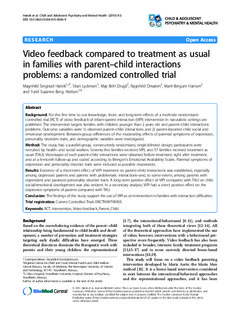| dc.contributor.author | Høivik, Magnhild Singstad | |
| dc.contributor.author | Lydersen, Stian | |
| dc.contributor.author | Drugli, May Britt | |
| dc.contributor.author | Onsøien, Ragnhild | |
| dc.contributor.author | Bergum Hansen, Marit | |
| dc.contributor.author | Berg-Nielsen, Turid Suzanne | |
| dc.date.accessioned | 2015-04-07T16:36:33Z | |
| dc.date.accessioned | 2015-04-24T12:16:14Z | |
| dc.date.available | 2015-04-07T16:36:33Z | |
| dc.date.available | 2015-04-24T12:16:14Z | |
| dc.date.issued | 2015 | |
| dc.identifier.citation | Child and Adolescent Psychiatry and Mental Health 2015, 9(3) | nb_NO |
| dc.identifier.issn | 1753-2000 | |
| dc.identifier.uri | http://hdl.handle.net/11250/282436 | |
| dc.description.abstract | Background: For the first time to our knowledge, short- and long-term effects of a multi-site randomizedcontrolled trial (RCT) of video feedback of infant–parent interaction (VIPI) intervention in naturalistic settings are
published. The intervention targets families with children younger than 2 years old and parent–child interactions
problems. Outcome variables were 1) observed parent–child interactions and 2) parent-reported child social and
emotional development. Between-group differences of the moderating effects of parental symptoms of depression,
personality disorders traits, and demographic variables were investigated.
Method: The study had a parallel-group, consecutively randomized, single-blinded design; participants were
recruited by health- and social workers. Seventy-five families received VIPI, and 57 families received treatment as
usual (TAU). Videotapes of each parent–child interactions were obtained before treatment, right after treatment,
and at a 6-month follow-up and coded according to Biringen’s Emotional Availability Scales. Parental symptoms of
depression and personality disorder traits were included as possible moderators.
Results: Evidence of a short-term effect of VIPI treatment on parent–child interactions was established, especially
among depressed parents and parents with problematic interactions–and, to some extent, among parents with
dependent and paranoid personality disorder traits. A long-term positive effect of VIPI compared with TAU on child
social/emotional development was also evident. In a secondary analysis, VIPI had a direct positive effect on the
depressive symptoms of parents compared with TAU.
Conclusion: The findings of the study support the use of VIPI as an intervention in families with interaction difficulties.
Trial registration: Current Controlled Trials ISRCTN99793905. | nb_NO |
| dc.language.iso | eng | nb_NO |
| dc.publisher | BioMed Central | nb_NO |
| dc.subject | RCT | nb_NO |
| dc.subject | Intervention | nb_NO |
| dc.subject | Video feedback | nb_NO |
| dc.subject | Parent | nb_NO |
| dc.subject | Child | nb_NO |
| dc.title | Video feedback compared to treatment as usual in families with parent-infant interaction problems: a randomized controlled trial. | nb_NO |
| dc.type | Journal article | nb_NO |
| dc.type | Peer reviewed | en_GB |
| dc.date.updated | 2015-04-07T16:36:33Z | |
| dc.source.volume | 9 | nb_NO |
| dc.source.journal | Child and Adolescent Psychiatry and Mental Health | nb_NO |
| dc.source.issue | 3 | nb_NO |
| dc.identifier.doi | 10.1186/s13034-015-0036-9 | |
| dc.identifier.cristin | 1235875 | |
| dc.description.localcode | © 2015 Høivik et al.; licensee BioMed Central. This is an Open Access article distributed under the terms of the Creative Commons Attribution License (http://creativecommons.org/licenses/by/4.0), which permits unrestricted use, distribution, and reproduction in any medium, provided the original work is properly credited. The Creative Commons Public Domain Dedication waiver (http://creativecommons.org/publicdomain/zero/1.0/) applies to the data made available in this article, unless otherwise stated. | nb_NO |
